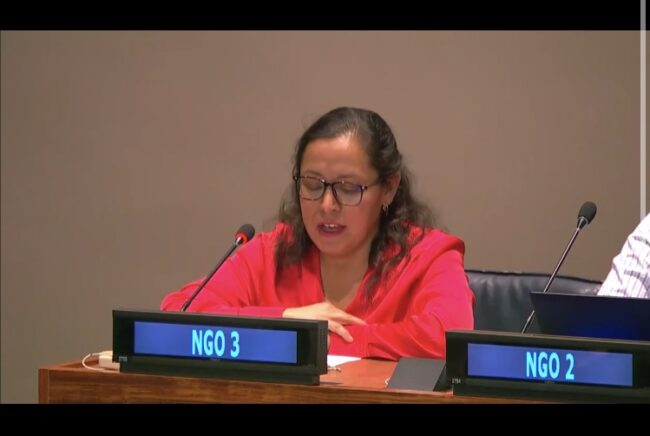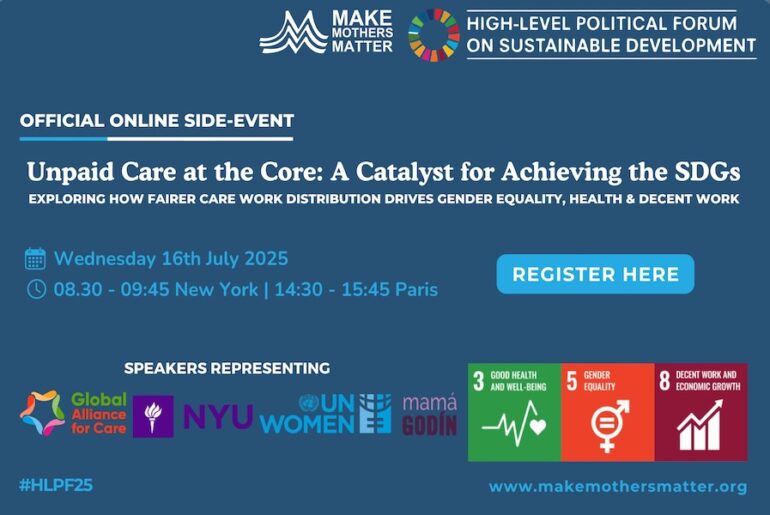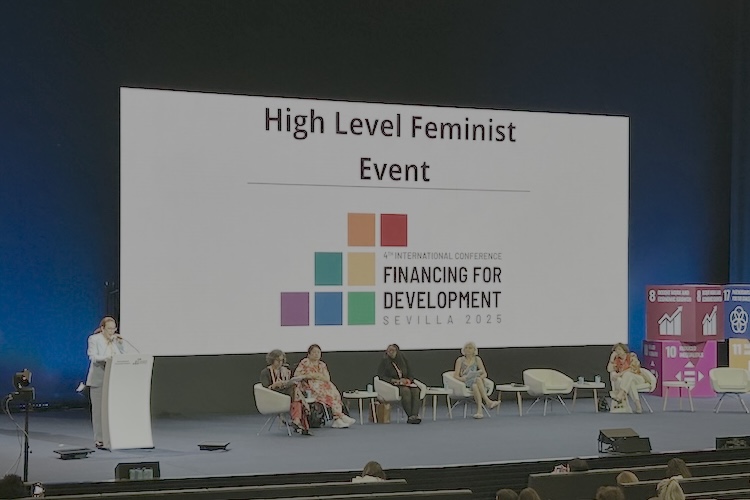Because mothers count
17.02.23
UN New York, CSocD61 - Those are the concluding words of our representative at the UN in New York to the the UN Commission on Social Development. She called on the Commission to reaffirm the importance of addressing the issue of the inequitable distribution of unpaid family care work, which is a major barrier to mothers accessing decent work.

The following is an extract from this intervention.
The Covid-19 pandemic has shed light on the issue of the inequitable distribution of unpaid care work and how it can be a major barrier to accessing decent work for women, especially when they are mothers.
It has also shown how essential and foundational this work is for the wellbeing of all, and for the functioning and future of our society and our economy. When estimating its financial value, unpaid care work represents between 10 and 30% of GDP. In some countries, more than half of the total work hours are unpaid.
Realizing Target 5.4 of the development agenda is an essential first step that must be re-prioritized. But this is not enough.
We at MMM are calling on the Commission to reaffirm the importance of addressing this issue to progress on women’s access to and participation in the labour market, and to promote the appropriate measures – using the 3R framework.
- Making unpaid care work visible using Time-Use Surveys is a necessary step to which member States have committed with target 5.4. And yet, as of 2018, only 72 States have conducted such surveys. In addition, unpaid care work must also be recognized as ‘work’, valuable and skillful work, which sustains our economy. It is an investment in human capital that deserves full support. Disconnecting basic social protection, including healthcare, from formal employment and making it universal is one concrete way to recognize the value of unpaid care work.
- Unpaid care work often compensates for the lack of basic public infrastructure, including water and sanitation, electricity, energy, ICT, and transportation, and the lack of essential public services like healthcare and care services. Accessible public infrastructure and services must be a top priority for governments, who must also ensure women’s participation in their development, so that they best serve their needs and reduce unpaid work.
- To close the care gap, unpaid care work must be framed as a collective responsibility, with everybody taking their share, including government and the private sector. This means initiating policies to promote a more equitable sharing between men and women, but also policies from both governments and the private sector to support unpaid caregivers.
The time has come to take a more holistic view of ‘decent work’, where both paid and unpaid care work are considered and their interrelation and interdependence recognized. The right to work and its relation to Care as a right – right to care, right to be cared for, and right to selfcare – needs to be reassessed and work policies rethought.
Because mothers count.
Jacqueline Leduc, our representative to the UN in New York, delivered this oral statement during the 61st UN Commission on Social Development (CSocD61), which took place 6-15 February 2023, with its main theme: ‘Creating full and productive employment and decent work for all as a way of overcoming inequalities to accelerate the recovery from the COVID-19 pandemic and the full implementation of the 2030 Agenda for Sustainable Development’.
See also:
- our written statement to the Commission on mothers and decent work
- the report and recording of our side-event, Leave no mother behind, which took place on 15 February 2023 on the margins of CSocD61
Envisioning care as a common thread to global crises
29.07.24
UN New York - Our virtual HLPF side-event brought together experts to shed light on how the various global crises we face (in particular climate change and other environmental crises,
We call for multi-stakeholder approach to recognise and support unpaid care work
21.07.24
UN New York - Participating in the meeting of the UN Economic and Social Council (ECOSOC) on care and support systems, MMM reaffirmed the principle of co-responsibility, which should underpin
The New EU Gender Equality Roadmap : A Call for Inclusion of Mothers
04.03.25
The European Commission’s initiative on a new Gender Equality Roadmap post-2025, marks a significant step forward in addressing gender disparities across the European Union. Make Mothers Matter (MMM








